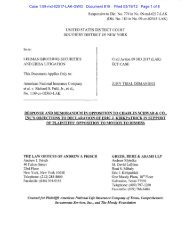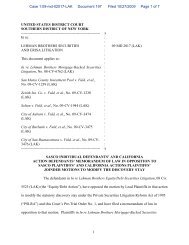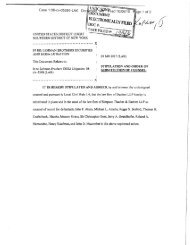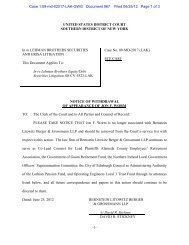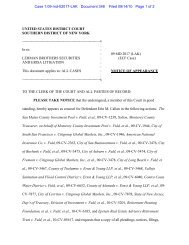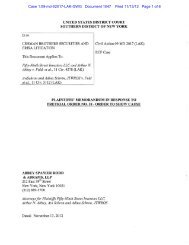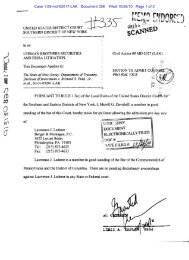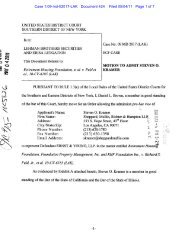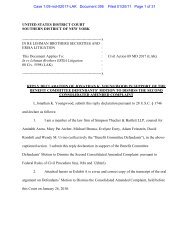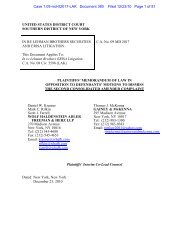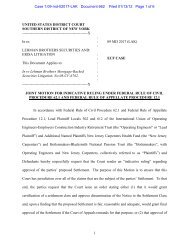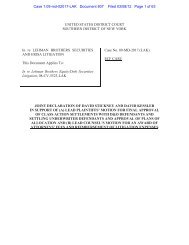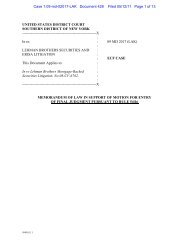Third Amended Complaint - Lehman Brothers Securities Litigation
Third Amended Complaint - Lehman Brothers Securities Litigation
Third Amended Complaint - Lehman Brothers Securities Litigation
Create successful ePaper yourself
Turn your PDF publications into a flip-book with our unique Google optimized e-Paper software.
purpose to the transactions. Indeed, as explained above, the Repo 105 transactions were a moreexpensive, form of short-term financing for <strong>Lehman</strong> than an Ordinary Repo transaction.64. Moreover, unlike an actual sale, <strong>Lehman</strong>’s repurchase agreements required <strong>Lehman</strong>to repurchase the collateral after a fixed period of time; they did not merely grant <strong>Lehman</strong> the rightto do so. While characterizing the short-term financing as a “sale” on its financials, <strong>Lehman</strong> in factwas obligated to repurchase these assets within days after the close of the reporting period.65. Furthermore, FAS 140 specifically notes that the determination of whether a transferof assets qualifies as a sale might depend upon a legal determination of whether such arrangementrepresents a “true sale at law.” <strong>Lehman</strong>, however, was unable to obtain a true sale opinion from anyUnited States law firm. <strong>Lehman</strong> did not disclose its inability to obtain such an opinion or itsdecision to nevertheless treat its Repo 105 transactions as sales. That <strong>Lehman</strong> attempted to satisfythe requirements of FAS 140 through an opinion from Linklaters, a law firm, in the UnitedKingdom within the context of English Law (and then channel Repo 105 transactions through a<strong>Lehman</strong> subsidiary in the United Kingdom) cannot justify the accounting treatment. Because noU.S. firm would provide the opinion under U.S. law, there was no basis in FAS 140 for recordingthe transactions as sales, nor was there legitimate business or economic substance behindchanneling the Repo 105 transactions through the United Kingdom.66. <strong>Lehman</strong>’s accounting for its Repo 105 transactions also failed fundamental tenets offinancial reporting under GAAP. GAAP requires that the overall impression created by financialstatements be consistent with the business realities of the company’s financial position andoperations, such that the financial statements are useful and comprehensible to users in makingrational business and investment decisions. See, e.g., FASCON 1, 9, 16, 33-34; FASCON 5, 5.FASCON 1 states that “Financial reporting should include explanations and interpretations to helpusers understand financial information.” 54. Under GAAP, “nothing material is left out of theinformation that may be necessary to [ensure] that [the report] validly represents the underlyingevents and conditions.” FASCON 2, 79-80. FASCON 5 explains that footnotes are an integral-19-



